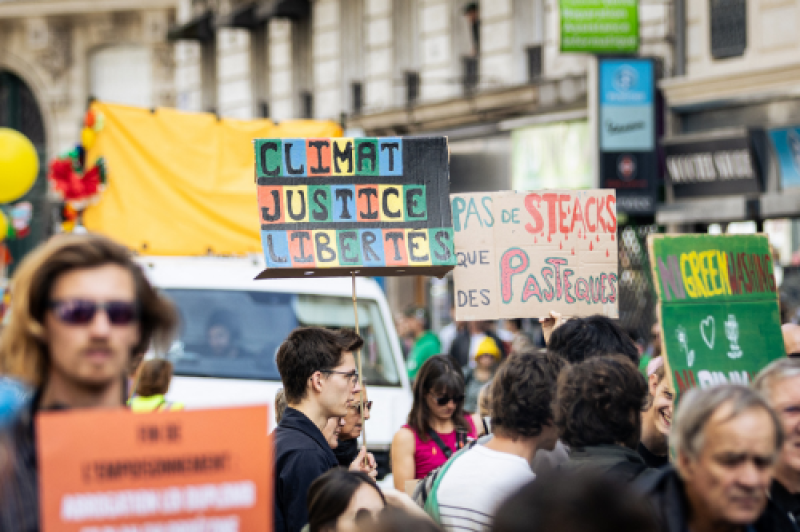- Dhaka’s air quality ‘unhealthy’ 5th worst in world Saturday |
- Dhaka’s air recorded unhealthy on Friday morning |
- Teesta activists announce ‘Silent Rangpur’ campaign in 5 districts |
- Ceasefire Offers Lifeline, but Gaza Hospitals in Ruins |
- Christensen calls next election most consequential in decades |
Mounting pressure on climate defenders: TI

A protestor holds a placard that says Climate Justice Freedoms during the March of Resistance to denounce climate inaction. Photo via AFP
The report from the United Nations Special Rapporteur on the situation of human rights defenders standing up for climate justice offers a stark assessment of the drivers behind these attacks. It finds that systemic corruption - from bribery and regulatory capture to the manipulation of justice systems - is fuelling impunity for violence against environmental defenders. The report urges governments and businesses to address corruption not only as a governance issue but as a fundamental threat to human rights and the environment.
Corruption and impunity: A global pattern
This is echoed by Transparency International’s new publication: The role of business in fighting impunity and corruption to protect environmental defenders. It expands on those findings and exposes how private sector misconduct, when coupled with weak governance, directly endangers environmental defenders. From Brazil’s Brumadinho dam disaster, where regulatory capture and corporate influence silenced whistleblowers, to Indonesia’s palm oil sector, where bribery and land grabs displaced Indigenous communities, corruption consistently emerges as both a driver of environmental destruction and a weapon against those who resist it.
The paper highlights the private sector’s dual potential as either a perpetrator of harm or a partner for integrity. Businesses that protect defenders, uphold transparency, and respect community rights not only mitigate legal and reputational risks but also strengthen long-term sustainability and social trust.
Eroding safeguards in a changing landscape
These patterns are also taking root in Europe with an alarming escalation in harassment and criminalisation of climate defenders. In France, for instance, the interior minister branded the environmental movement Les Soulèvements de la Terre as “ecoterrorists” in 2022 and attempted to dissolve the group - a decision later overturned by the courts. The trend reflects a growing intolerance for environmental advocacy, one that directly undermines democratic freedoms and climate action.
Strategic lawsuits against public participation (SLAPPs) are increasingly being deployed to silence journalists and activists exposing corruption or environmental harm. The UN report warns that such tactics, alongside covert lobbying and influence over environmental regulation, represent a form of soft corruption - one that erodes public trust and democratic accountability. If unchecked, Europe risks replicating the same governance failures that have enabled violence elsewhere.
What needs to happen at COP30
As momentum builds toward COP30 in Belém, Brazil, the spotlight is increasingly on climate justice, human rights, and the protection of civic space. It is time to secure global commitments that safeguard those on the frontlines of climate action, and ensure they are protected, not silenced or persecuted.
Transparency International is calling on businesses to embed anti-corruption and human rights due diligence throughout their operations, ensure transparency in lobbying and supply chains, and commit to zero tolerance for attacks on defenders. Policymakers must commit to agreements like Aarhus and Escazú and enact robust anti-SLAPP legislation, strengthen whistleblower protections, and enforce corporate accountability through instruments like the EU Corporate Sustainability Due Diligence Directive (CSDDD). Investors, too, have a role to play by conditioning finance on transparent governance and the protection of human rights defenders.
Climate summit or industry trade fair?
Transparency International analysed how companies attending COPs engage with climate policy, using data from LobbyMap. Findings are troubling.
The role of business in fighting impunity & corruption to protect environmental defenders
This working paper exposes how corruption and corporate misconduct enable attacks against environmental defenders and allow harm to go unpunished. It also highlights how businesses can be part of the solution.
Chasing grand corruption
Drawing on surveys and in-depth interviews with law enforcement and prosecutorial authorities in nine EU countries, this report explores the practical barriers that hinder investigations into corruption-related money laundering.

